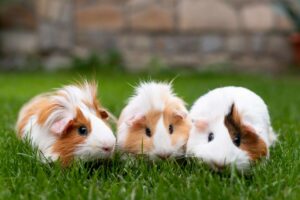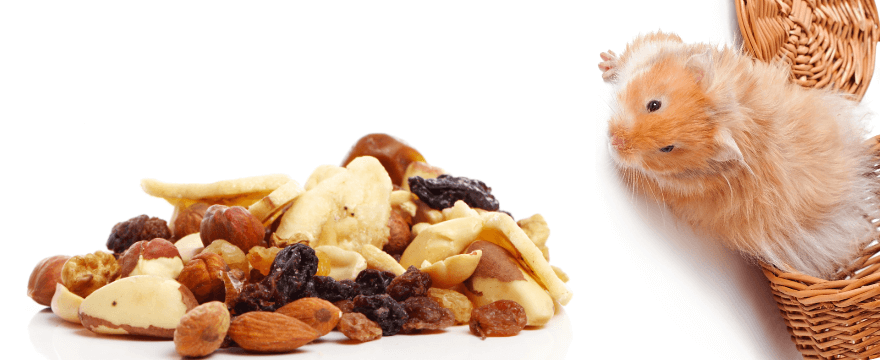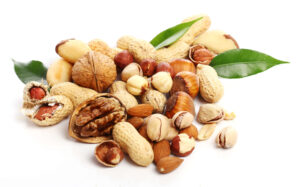Have you ever wondered if your guinea pig could enjoy some of the nuts you’re snacking on? I am aware that I have. There’s no reason why pet owners shouldn’t want to feed their animal friends their favorite foods. However, guinea pigs have very different food needs than humans. The question is, can guinea pigs eat nuts?
To keep your guinea pig healthy and happy, this article will go into more detail about the possible risks and benefits.
Understanding Guinea Pig Dietary Needs
Guinea pigs have an organic diet that mainly consists of plant-based foods, as they are herbivores. Plants with grass, herbs, and leaves are what they normally eat in the wild. When they are at home, guinea pigs should eat hay, fresh veggies, and pellets that are made just for them.
Basic Nutritional Needs
A diet rich in fiber and vitamin C is essential for the well-being of guinea pigs, as they are unable to produce this vital vitamin themselves. Vegetables like bell peppers and leafy greens give animals the vitamins and minerals they need, while fresh hay gives them fiber. Guinea pig pellets can help them get all the nutrients they need.
What Kinds of Nuts Are There?
Almonds, peanuts, walnuts, and cashews are some of the most common nuts people eat as snacks. While they do contain a wealth of nutrients, they are also rich in fats and calories.
Nuts are packed with beneficial fats, protein, and a wide range of essential vitamins and minerals. Unfortunately, these nutrients do not meet the dietary requirements of guinea pigs. Due to the high-fat content, small animals such as guinea pigs may experience health problems like obesity.
Potential Risks of Feeding Nuts to Guinea Pigs
High Fat Content
Feeding nuts to guinea pigs can be a cause for concern due to their high fat content. Guinea pigs have unique dietary needs that differ from those of humans. Consuming high-fat foods can result in obesity, liver issues, and various other health complications for guinea pigs.
Potential dangers of choking
It’s important to be cautious when feeding guinea pigs nuts, as they can pose a choking hazard due to their size and hardness. Guinea pigs have small mouths and teeth that are specifically adapted for chewing fibrous plant material rather than hard nuts.
Digestive Issues
Foods that are high in fat and protein can easily affect the delicate digestive systems of guinea pigs. Consuming nuts can lead to gastrointestinal issues such as diarrhea and bloating, posing a potential risk to these fragile creatures.
Allergic Reactions
Certain guinea pigs may experience allergies to nuts, resulting in symptoms such as itching, swelling, and breathing difficulties. To prevent potential allergic reactions, it’s important to be cautious about the type of food you give them.
Professional Insights and Veterinary Guidance
Many veterinarians and pet nutrition experts strongly prevent the practice of feeding nuts to guinea pigs. They stress the significance of following a diet that replicates the natural food of guinea pigs. Instead of nuts, it is recommended to provide a variety of fresh vegetables and fruits in moderation for a safer and healthier alternative.
Safe Alternatives to Nuts
Snacks for a Balanced Lifestyle There are a wide variety of safe and nutritious treats available for your guinea pig.
Here are some excellent choices:
- Enjoy a variety of fresh vegetables, such as carrots, cucumbers, bell peppers, and leafy greens.
- Recommended fruits include apples (seedless), strawberries, and blueberries (in moderation due to their sugar content).
- Herbs such as parsley, cilantro, and basil.
Introducing New Foods
Introducing Different Types of Food It is important to gradually introduce new foods to your guinea pig’s diet. Begin with small quantities and monitor your pet for any indications of digestive discomfort or allergic responses.
What to Do If Your Guinea Pig Eats Nuts
-
Immediate Steps
If your guinea pig happens to ingest a nut, it is important to promptly eliminate any remaining fragments from its surroundings. Also, keep a close eye on your furry friend for any indications of discomfort or sickness.
-
Signs to Watch For
Be aware of signs such as lethargy, diarrhea, bloating, or difficulty breathing. These signs may suggest that your guinea pig is experiencing an adverse reaction to the nuts.
-
When to Contact a Veterinarian
If you observe any worrisome symptoms, contact your vet right away. Proactive measures can help prevent the progression of more severe health problems.
Frequently Asked Questions (FAQ’s)
What type of nuts do guinea pigs eat?
Avoid feeding nuts to guinea pigs. Although some nuts, such as almonds, peanuts, walnuts, and cashews, are enjoyed by humans as snacks, they should be avoided by guinea pigs because they have high-fat content and can pose a choking risk.
What is toxic to guinea pigs?
Avoid feeding guinea pigs toxic foods, such as chocolate, caffeine, onions, garlic, and high-fat foods like nuts. These can lead to digestive issues, poisoning, or other health problems in guinea pigs.
Are guinea pigs allergic to nuts?
Certain guinea pigs may be allergic to nuts, which can result in symptoms such as itching, swelling, and breathing difficulties. Therefore, it’s important to be cautious about the type of food you give them to prevent any potential allergic reactions.
Are almonds poisonous to guinea pigs?
While almonds are not toxic to guinea pigs, they should be avoided. Their high fat content can pose a choking risk.
Finally, it’s not a good idea to let your guinea pig share your snacking habits. The rich food is too much for their weak gut systems to handle, which could cause health problems. But don’t worry—there are lots of tasty and safe snacks out there for you to try!


Leave a Reply